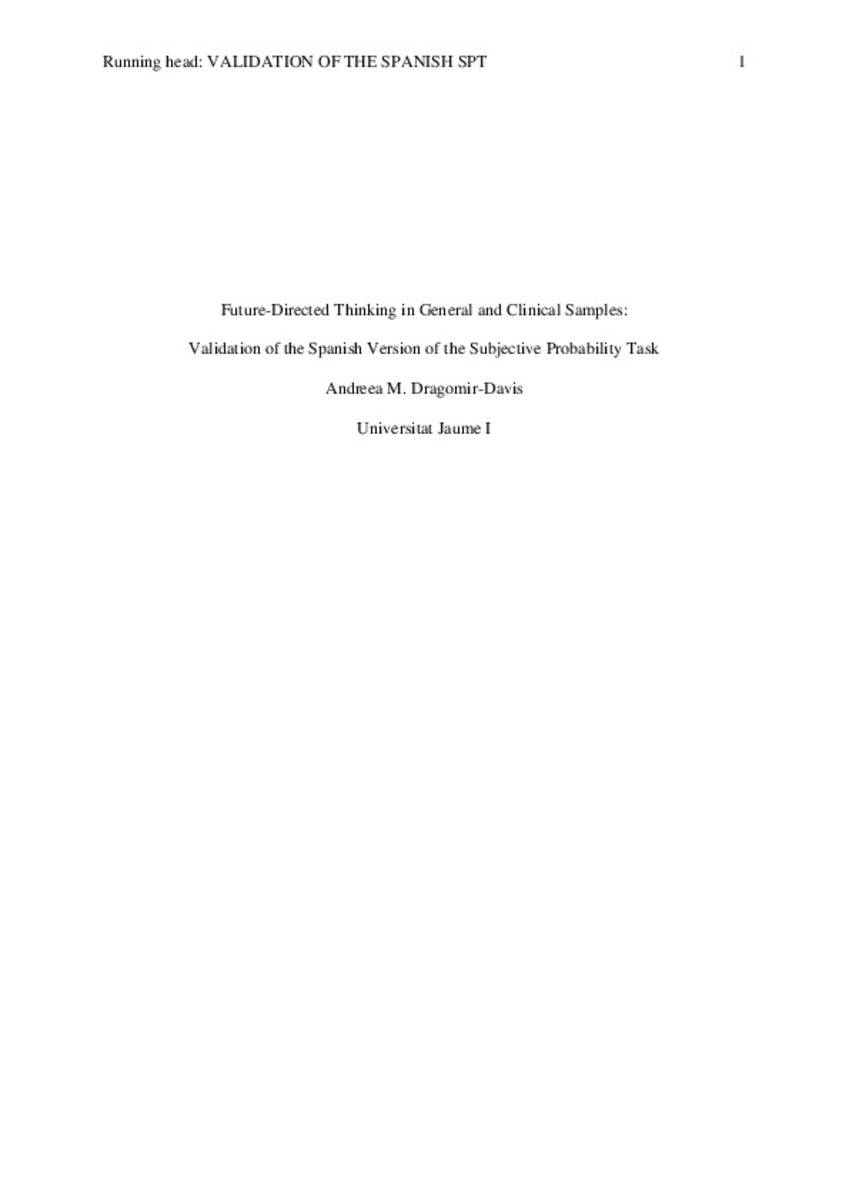Mostrar el registro sencillo del ítem
Future-Directed Thinking in General and Clinical Samples: Validation of the Spanish Version of the Subjective Probability Task
| dc.contributor | Botella Arbona, Cristina | |
| dc.contributor.author | Dragomir-Davis, Andreea Maria | |
| dc.contributor.other | Universitat Jaume I. Departament de Psicologia Bàsica, Clínica i Psicobiologia | |
| dc.date.accessioned | 2015-12-14T13:02:55Z | |
| dc.date.available | 2015-12-14T13:02:55Z | |
| dc.date.issued | 2014-10-14 | |
| dc.identifier.uri | http://hdl.handle.net/10234/143465 | |
| dc.description | Treball Final de Màster Universitari en Psicopatologia, Salut i Neuropsicologia. Codi: SAL132. Curs acadèmic: 2013-2014 | ca_CA |
| dc.description.abstract | Future-directed thinking is an essential characteristic of human behavior, consisting of the ability to project oneself into the future in order to pre-experience an event (Atance & O’Neill, 2001). Several instruments that measure different aspects of future-directed thinking have been developed. The Subjective Probability Task (SPT, MacLeod, Byrne & Valentine, 1996) is an instrument that assesses the tendency of holding positive and negative expectancies for the future. The present study seeks to validate the Spanish version of the SPT in clinical and general populations, and to test a model of two cognitive-affective systems in Spanish-speaking clinical and general populations. The sample consisted of 321 participants, 211 participants belonging to the general population, and 110 belonging to the clinical population. The participants completed measures of positive and negative affect, worry, hopelessness, anxiety, depression, and future expectancies. The results of the exploratory factor analysis yielded 2 factors that corresponded to the 2 subscales of the SPT. Significant differences were found between the general and clinical samples regarding both negative and positive expectancies, suggesting that both positive and negative future-thinking are important aspects to consider in clinical populations. Overall, the psychometric properties of the SPT have proved to be satisfactory. The two-system model was partially supported by the results of this study. Implications of these results are discussed. | ca_CA |
| dc.description.abstract | El pensamiento dirigido hacia el futuro es una característica esencial de la conducta humana, que consiste en la capacidad de proyectarse en el futuro con el fin de pre-experimentar un evento (Atance y O’Neill, 2001). Varios instrumentos que miden diferentes aspectos del pensamiento dirigido hacia el futuro fueron desarrollados. La tarea de probabilidad subjetiva (SPT, MacLeod, Byrne y Valentine, 1996) es un instrumento que evalúa la tendencia de tener expectativas positivas y negativas para el futuro. El presente estudio trata de validar la versión española de la SPT en población clínica y general, y poner a prueba un modelo de dos sistemas cognitivo-afectivos en población clínica y general hispanohablante. La muestra estuvo formada por 321 participantes, 211 participantes pertenecientes a la población general, y 110 pertenecientes a la población clínica. Los participantes completaron medidas de afecto positivo y negativo, preocupación, desesperanza, ansiedad, depresión, y expectativas futuras. Los resultados del análisis factorial exploratorio arrojaron 2 factores que corresponden a las 2 subescalas de la SPT. Se encontraron diferencias significativas entre la muestra general y clínica en relación con las expectativas negativas y positivas, lo que sugiere que tanto el pensamiento dirigido hacia el futuro positivo, como el negativo son aspectos importantes a considerar en poblaciones clínicas. En general, las propiedades psicométricas de la SPT han demostrado ser satisfactorias. El modelo de dos sistemas fue parcialmente apoyado por los resultados de este estudio. Se discuten las implicaciones de estos resultados. | ca_CA |
| dc.format.extent | 30 p. | ca_CA |
| dc.format.mimetype | application/pdf | ca_CA |
| dc.language.iso | eng | ca_CA |
| dc.publisher | Universitat Jaume I | ca_CA |
| dc.rights | Attribution-ShareAlike 4.0 Spain | * |
| dc.rights.uri | http://creativecommons.org/licenses/by-sa/4.0/ | * |
| dc.subject | Màster Universitari en Psicopatologia, Salut i Neuropsicologia | ca_CA |
| dc.subject | Máster Universitario en Psicopatología, Salud y Neuropsicología | ca_CA |
| dc.subject | Master's Degree in Psychopathology, Health and Neuropsychology | ca_CA |
| dc.subject | future-directed thinking | ca_CA |
| dc.subject | Spanish validation | ca_CA |
| dc.subject | Subjective Probability Task | ca_CA |
| dc.subject | pensamiento dirigido hacia el futuro | ca_CA |
| dc.subject | validación española | ca_CA |
| dc.subject | Tarea de Probabilidad Subjetiva | ca_CA |
| dc.title | Future-Directed Thinking in General and Clinical Samples: Validation of the Spanish Version of the Subjective Probability Task | ca_CA |
| dc.type | info:eu-repo/semantics/masterThesis | ca_CA |
| dc.educationLevel | Estudios de Postgrado | ca_CA |
| dc.rights.accessRights | info:eu-repo/semantics/openAccess | ca_CA |
Ficheros en el ítem
Este ítem aparece en la(s) siguiente(s) colección(ones)
-
TFM: Màster Universitari en Psicopatologia, Salut i Neuropsicologia [38]
SAL016, SAL132, SAL232








